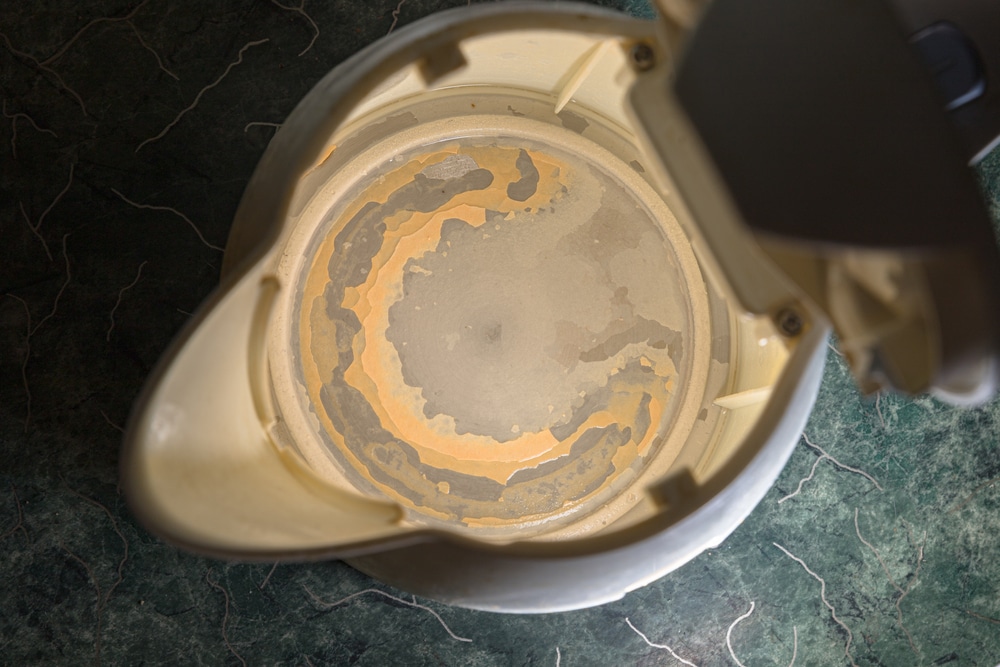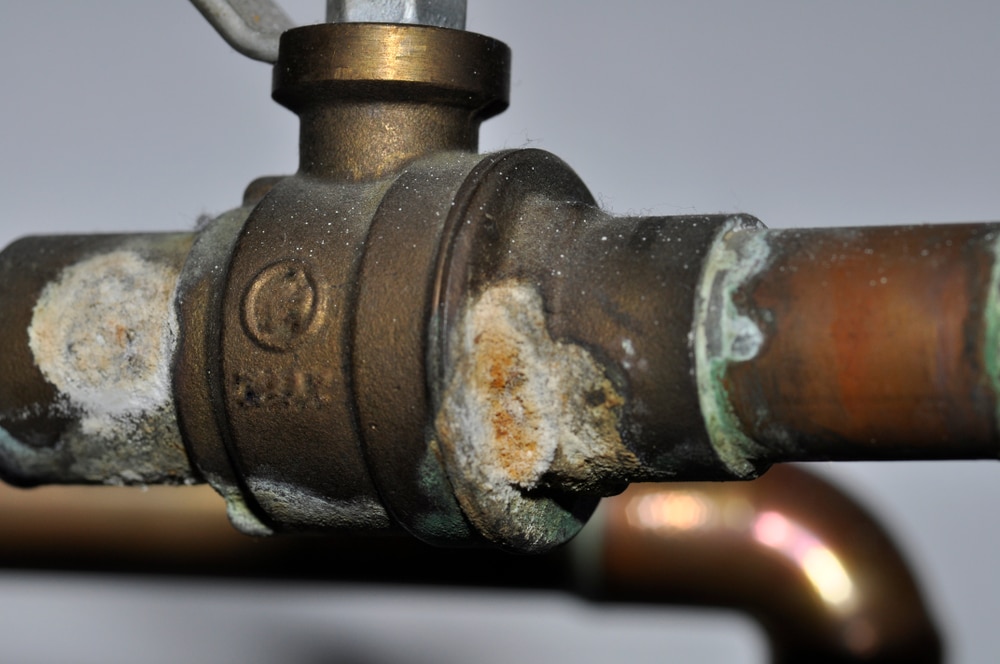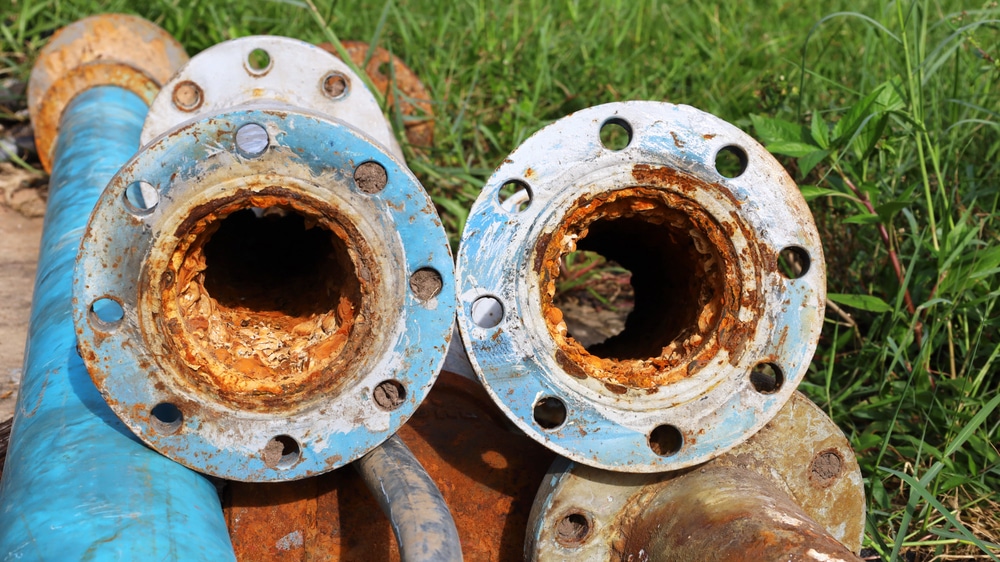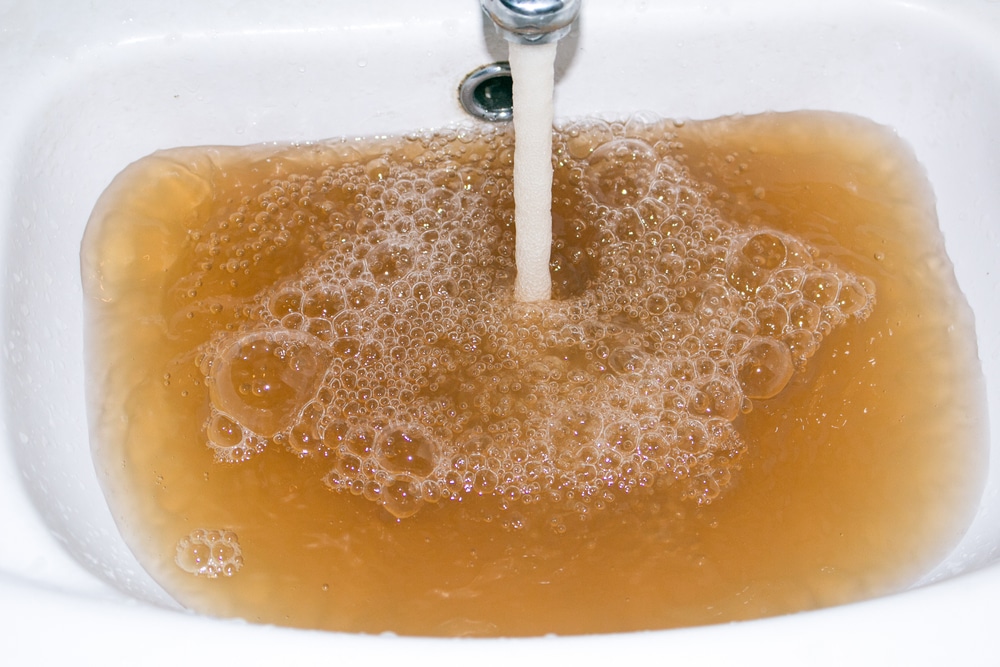Why is my hot water brown all of a sudden? Brown hot water is typically the result of rust and sediment buildup at the bottom of your water heater. It could also be a sign of water supply contamination.
Here’s a tabular view of causes & solution:
| Brown Hot Water Cause | Sign | Solution |
|---|---|---|
| Sediments in water heater | Visible sediments at the bottom and walls of the heater | Flush the water heater |
| Corroding water heater | Rust outside and inside the heater | Get a new water heater |
| Old Galvanized Pipes | Brown water in cold and hot water faucets | Replaces water pipes in the whole house |
| Water supply contamination | Iron taste & odor, Thick & slimy water, Stained clothes during laundry | Get an iron filter system (Our recommendation: Springwell ULTRA) |
1. Sediments Gathered at the Bottom of Water Heater Can Cause Brown Hot Water
Like many household appliances, water heaters need to be routinely maintained to function properly. Failing to do so may cause minerals and other sediments to build up within the heater.

The most common sediment deposit found in residential water heaters is calcium carbonate. Sediments like calcium carbonate can damage a water heater over time if not routinely maintained. One quick solution is to flush the tank each year to prevent excessive scaling.
The flushing process involves turning off the heat source, be it electric or gas, and then draining the water tank.
How To Flush a Hot Water Heater
- Shut off the heat source. If it’s an electric water heater, turn off the electric switch. If it’s gas, put it in pilot mode.
- Turn off the cold water valve and connect a hose to the drain valve. Place the other end of the hose outside, in the bathtub, or on the floor.
- Turn on hot water at the faucet and open the drain valve. Allow the water to drain through the hose until the tank is empty.
Ensure that the drained water runs clear once you’re done flushing the heater. Then, you can refill your empty tank with water from the cold water supply.
2. Corroding Water Heater Can Make the Hot Water Brown
A rusting or corroding water heater is another reason for brown hot water. If you aren’t practicing regular maintenance, you may be unaware of the rapid deterioration of your heater. Typically, water heaters serviced routinely can have a lifespan of about 15 years or more.

When there’s noticeable rust on the outside of the heater, it will likely rust or corrode inside as well. It’s only a matter of time before it gives out on you. Unfortunately, if rust is the culprit, the best solution is to completely replace the water heater.
Once replaced, establish a schedule for routine maintenance. Keep an eye on the heater for any signs of rust—the sooner you notice it, the better.
Identifying Corrosion
If you’re unsure whether your water heater is corroding, here are a few things to look for:
- Rusting valves and pipe fittings
- Leaking water tank
- Rusting connection pipes.
If you identify corrosion as the main cause, contact a professional to have a look and replace the heater.
3. Old Galvanized Pipes Can Turn Hot Water Brown
Galvanized pipes have a zinc coating to prevent rusting. Plumbing systems in homes built before the 1980s are more likely to have galvanized pipes.

Over time, the pipes rust from excessive water exposure, resulting in brown tap water. The easiest way to figure out if you have galvanized pipes is to check both hot and cold water since galvanized pipes affect both temperatures. If the cold water is discolored as well, then you can eliminate the two causes above and call a plumber to check out the condition of the pipes.
The permanent remedy is to replace the old galvanized pipes with erosion-resistant PVC pipes.
4. Brown Hot Water Might Be a Sign Of Water Supply Contamination
Although the Safe Drinking Water Act protects tap water quality, contaminated water supply is still a problem in many cities.

Here are other common signs of water supply contamination:
- Cloudy water
- Yellow water
- Brown or orange water
- Chlorine smell (water treatment plants use chlorine to decontaminate water)
- Metallic taste
How Concerned Should You Be?
You should be very concerned, as clean water is a must for many aspects of our daily lives: cooking, cleaning, bathing, drinking, and washing hands. Sometimes, brown hot water takes care of itself, but it’s not always the case.
In rural areas where the water is supplied by a well, brown well water poses an even bigger problem as there might be more to it than rusty heater or water supply contamination.
No, brown hot water isn’t safe to drink. Never consume it. Even if the reason is as simple as excess iron or calcium carbonate, they’re still quite dangerous, and the after-effects aren’t worth the risk.
Though unappealing, brown hot water may be less harmful to bathe and shower in. Do note that high levels of iron or sediments in water might give you a bit of a rash. That’s especially the case if you’re already sensitive to it.
Had brown water coming from my hot water heater that was only 23 months old. Replaced the anode rod, it was severely pitted. .
Water came back brown again .
Replaced the hot water heater and now within two days i have brown water again and this only happens on the hot water side.
This house is 9 years old and it has all new pex lines
Darrell, did you find a solution to this? I’m experiencing the same issue. Please respond.
Thanks
I have the same problem
It’s essential to be aware of water quality and the factors that can affect it. This article provides valuable information for homeowners and tenants to address and prevent such problems. Keep up the good work in educating the public about water safety!
We are having the same problem with brown water only and are hot water faucets. We live in a townhouse. No one else seems to be having this problem.